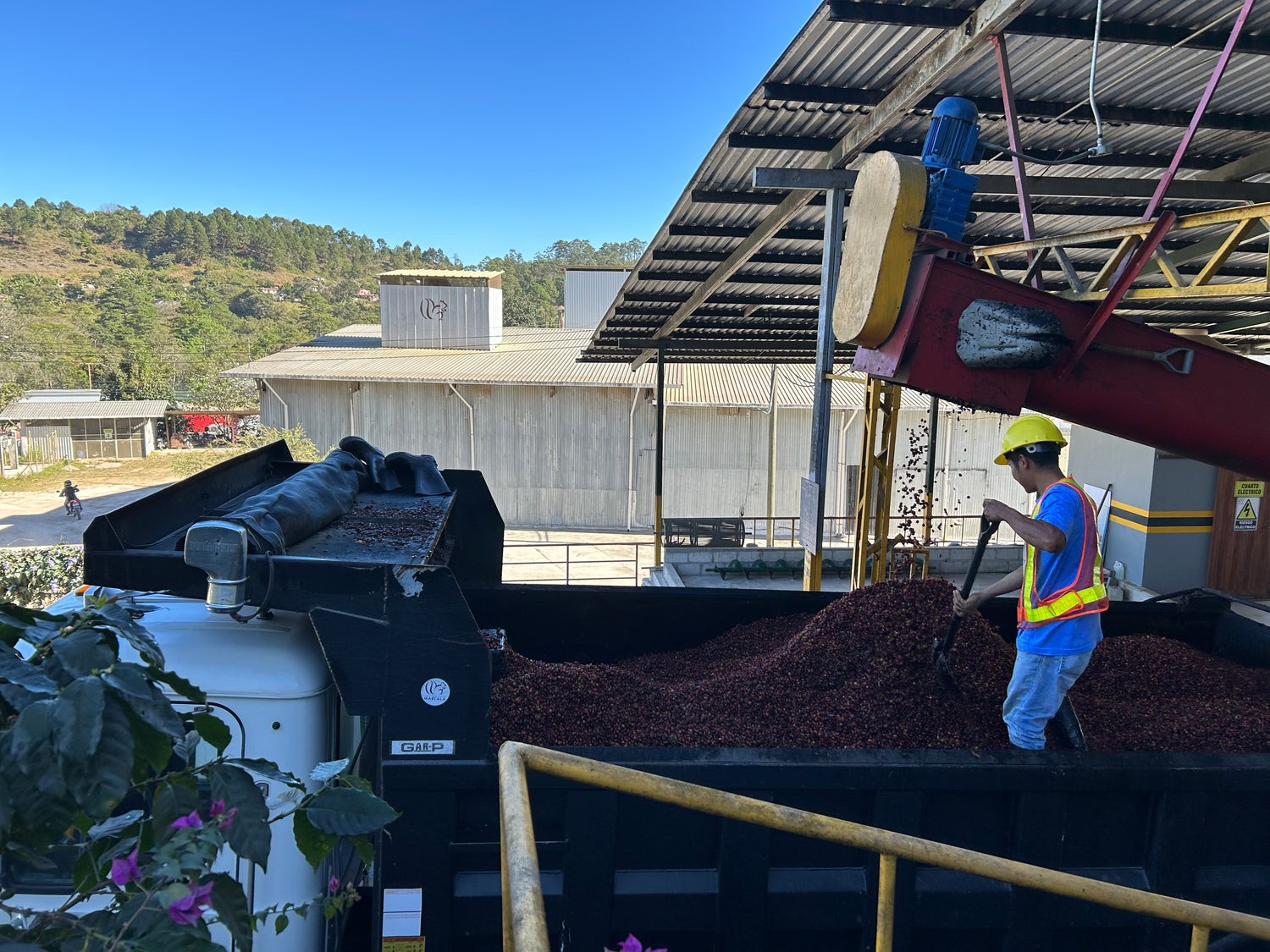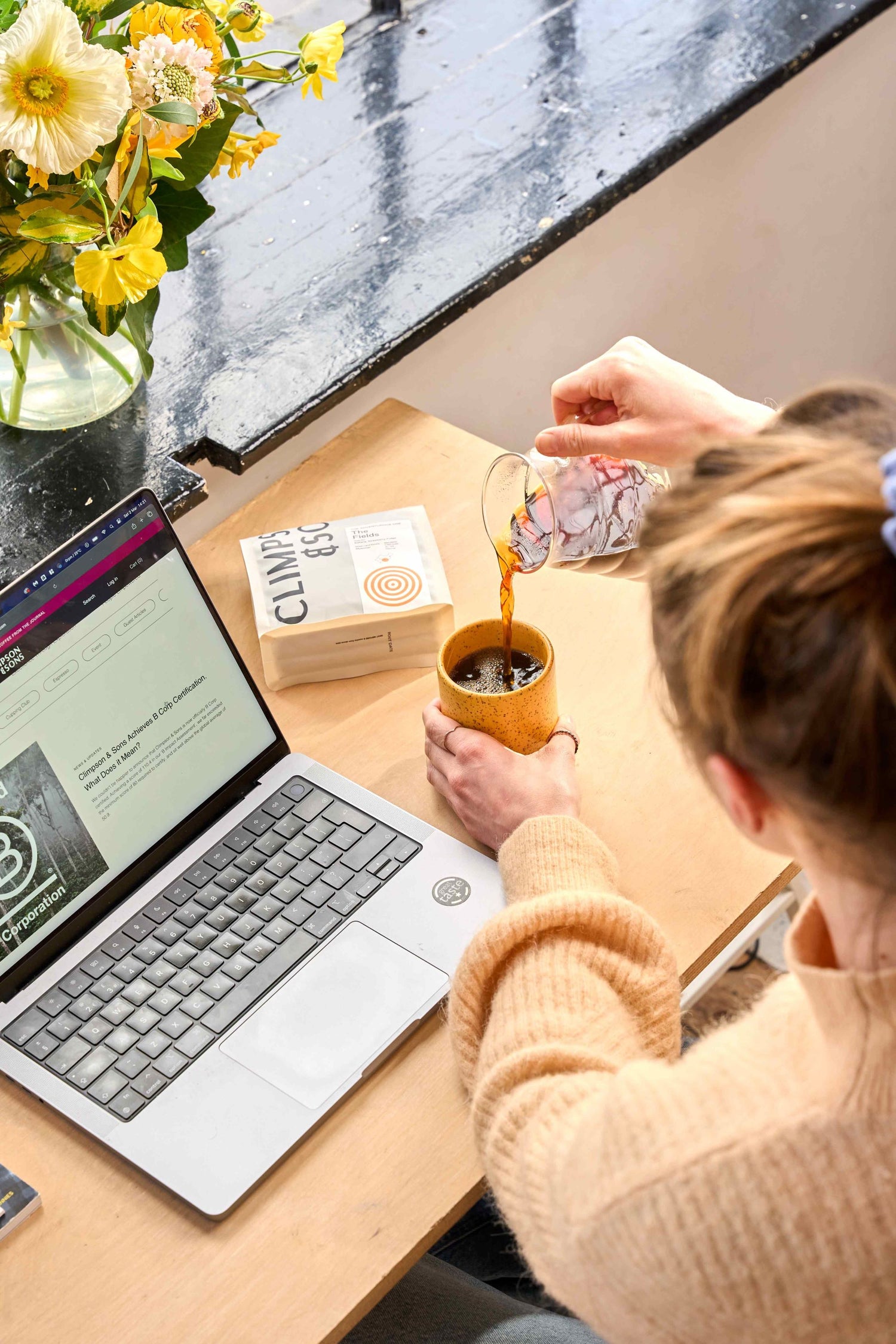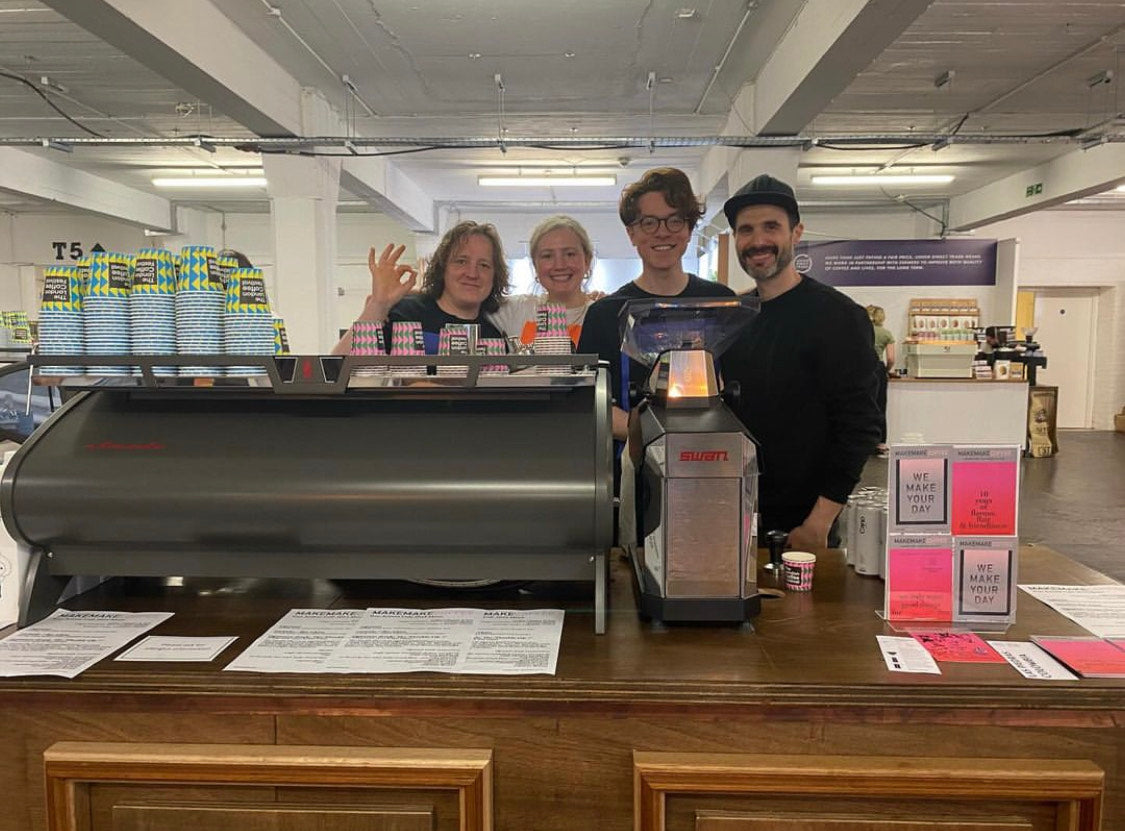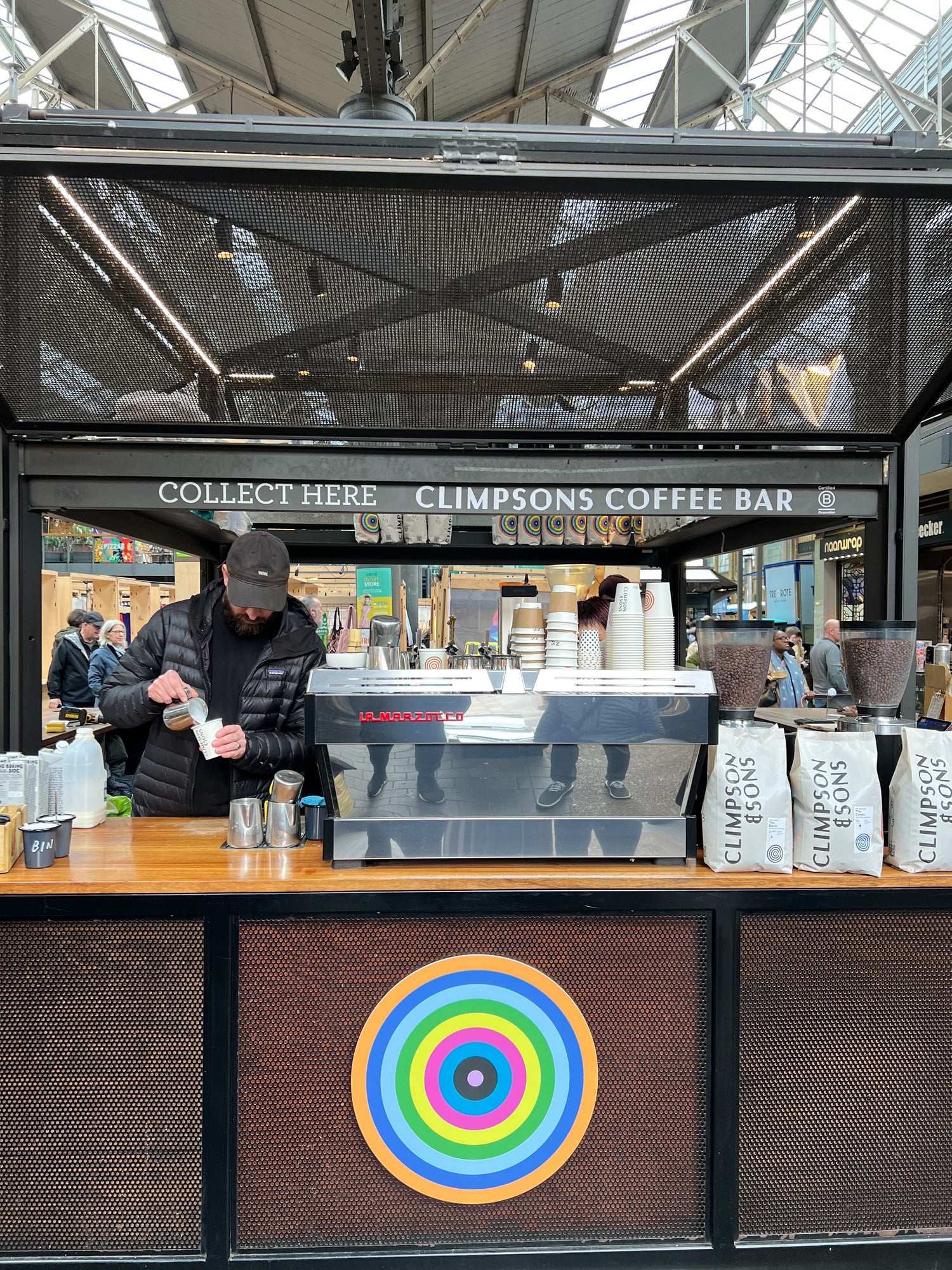Coffee drinkers, you may well have heard the term ‘specialty coffee’ before, often found in reference to coffees of higher quality and traceability. But what does specialty coffee actually mean? And how can we tell the difference between these coffees and a commercially produced bean? In contrast to the mass-produced commodity coffees you might find in a supermarket or high street chain, specialty coffee has undergone a thorough and objective grading system, ultimately leading to guaranteed quality of production and an elevated flavour when drinking.
Specialty coffee continues its rise in popularity, with more and more coffee shops, cafes and restaurants across the world choosing to serve more refined coffees sourced and roasted by specialty roasters, such as ourselves. We’re proud to have been part of this stride towards making specialty quality available to all for the last 22 years. Our commitment to specialty coffee and a sustainable supply chain was noted in 2023 with our achievement of B Corp certification.
The start of specialty
We first hear the term specialty used by coffee’s feminist pioneer Erna Knutsen. Working as a secretary for a coffee brokerage in San Francisco, Erna would be responsible for tracking coffee as it was imported. Here, she noticed an opportunity to import far smaller lots of coffee (typically, coffees were only imported in large, shipping container volumes) to smaller, local roasters and began to work to connect the supply chain. She gathered a reputation among roasters and famously coined the phrase ‘specialty coffee’ during an interview with the Tea and Coffee Trade Journal in 1974.
And it stuck. The Specialty Coffee Association (SCA) was founded in 1982 by a small group of coffee professionals, forming an alternative to mass-produced commercial coffee for independent roasters. Here a standardised and precise system of cupping, or tasting, coffees was formed that is still used to this day. In this system, aroma, taste, aftertaste, acidity, body, balance, cleaning, sweetness, uniformity and general profile are all assessed, as well as taking into account any defects in the bean, to create a score out of 100. From this score, any coffee of 80 or above can be deemed as specialty. These coffees are the cream of the crop.
How can you tell the difference between specialty and commodity?
“Speciality coffee is a coffee or coffee experience recognised for its distinctive attributes, and because of those attributes, has significant extra value in the marketplace.” (SCA From Values to Values: Determining the Worth of Coffee)
Beyond the numerical difference of the scorecard, there are also more nuanced differences between specialty and commodity coffee to look out for. An updated SCA definition of specialty coffee from 2021 highlights the importance of attributes - these could be characteristics such as origin, processing and flavour profiles, which alongside a tasting score of 80 or more, goes to mark a coffee as specialty. When we define it in this way, specialty is far more than a number. Specialty is a culture, an experience.
So what can we look out for to identify a specialty coffee from the rest?
Origin & Altitude:
All coffee is grown in a global equator spanning strip known as the ‘green belt’. This cross-continental band covers a vast range of producing regions, from the world’s biggest coffee producing countries like Brazil, Vietnam and Colombia to the birthplace of the caffea plant, Ethiopia, as well as stand-out emerging regions like Myanmar. While each of these producing regions is associated with unique flavour profiles, origin alone is not a clear indicator towards specialty or commodity

Within this global horizontal belt, perhaps a better indicator towards specialty is the altitude at which coffee is grown rather than its country of origin. Elevation indicates how high above sea level a coffee is produced, with a higher altitude resulting in a lower average temperature and therefore a slower maturation rate. This is something you will see on all of our coffee labelling. If you spot an altitude of 1,200 metres or more, it is often a nod towards a more quality coffee and an indicator that what you’re drinking is probably of specialty grade.
Production & Processing:
We can also look at the ways in which producers work at source to indicate if a coffee is specialty or not. Producers will grow a crop with the intention of marketing it towards a commercial or a specialty market, with different varieties, growing environments and processing methods being better suited to one market or the other. A farmer may produce different coffees for each market - for example, a producer may have some coffees of a commercial grade, but also have a smaller lot of coffees that they have meticulously prepared for the specialty market. These coffees are kept separate from the rest, allowing traceability to the precise plot of land it was grown on. Our partners COMSA cooperative are one such example, producing coffee for commodity, specialty and microlots and in doing so, rewarding farmers for going the extra mile to produce that extra special cup.

When looking for coffee, look for a roastery that shares information from the producer, highlighting the detail and expertise that has gone into its production. A specialty coffee label will often include detailed information on the variety and processing method of the coffee as well as the location and sometimes name of the individual producer. On all Climpson & Sons coffees you will find information on the name of the farm, region of production, altitude, variety and processing method.
“Great coffee starts with the producer, whose family likely has spent generations perfecting their approach to farming the highest quality coffee possible. Grown in select altitudes and climates and nursed for years before the first harvest, the producer who creates specialty coffee devotes his or her life to refining and perfecting the highest quality coffee on the planet. For them, it is quality not quantity that is the most important consideration. Only coffees free of defects and picked at their peak of ripeness will continue on to the next hands that will shape them. For the farmer, being able to connect with quality-minded buyers ensures a higher profit option which supports individuals, families and communities around the world.” (SCA ‘What is Specialty Coffee?’)
Traceability:
When reading a coffee label from a supermarket or commercial grade coffee house, you may see ‘Coffee from Central America’ or perhaps ‘Coffee from Colombia’. Colombia covers a size of 440,00 square miles and has a population of 52 million. With very large countries like this, there is very little traceability in simply stating the country of origin, let alone the quality and age of the coffee. Specialty coffee prides itself on being able to identify the exact farm and know the name of the producer or farmer whom the coffee grows. At Climpsons, we are regularly in touch with many of the coffee farmers we work with, receiving updates directly through Instagram and Whatsapp.

Our current Broadway Blend label, featuring detailed information on each coffee's origin and processing.
Flavour & Roast Profile:
With this higher quality of production there is an elevated flavour in coffees deemed as specialty. Typically you will find more subtle, delicate and defined flavour notes in specialty coffee. Much of these flavours will depend on the region of production, but the refinement is something to look out for. Look for precision in flavour notes, a particular fruit, nut or herbal combination beyond the broader terms of ‘chocolate’ or ‘citrus’. On our coffees you will spot tasting notes ranging from pecans to pears, from chamomile to sherbet.
The global community of specialty coffee
Specialty coffee values community, shared knowledge and working collectively to achieve the shared goal of better quality coffee, produced in a way that is both economically and environmentally sustainable for everyone involved. The process of bringing a specialty coffee from bean to cup requires the highest standards across every part of the supply chain. It is this collective accomplishment that makes the whole industry something special.
‘This is not the work of only one person in the lifecycle of a coffee bean; specialty can only occur when all of those involved in the coffee value chain work in harmony and maintain a keen focus on standards and excellence from start to finish. This is no easy accomplishment, and yet because of these dedicated professionals, there are numerous specialty coffees available right now, across the globe, and likely right around the corner from you.’ (SCA ‘What is Specialty Coffee?’)
Our role as a specialty coffee roastery is to make high quality, ethically grown and sourced coffees available to all. Head to our wholesale page to find out more about using our coffee for your business.



